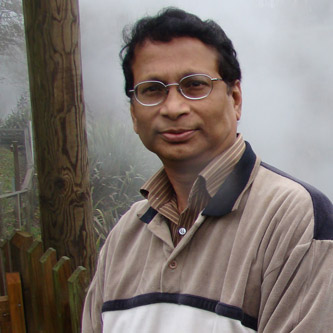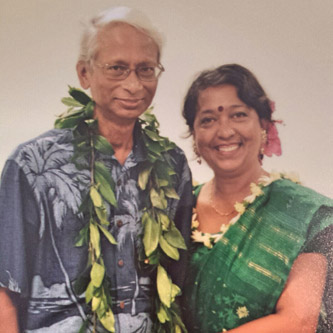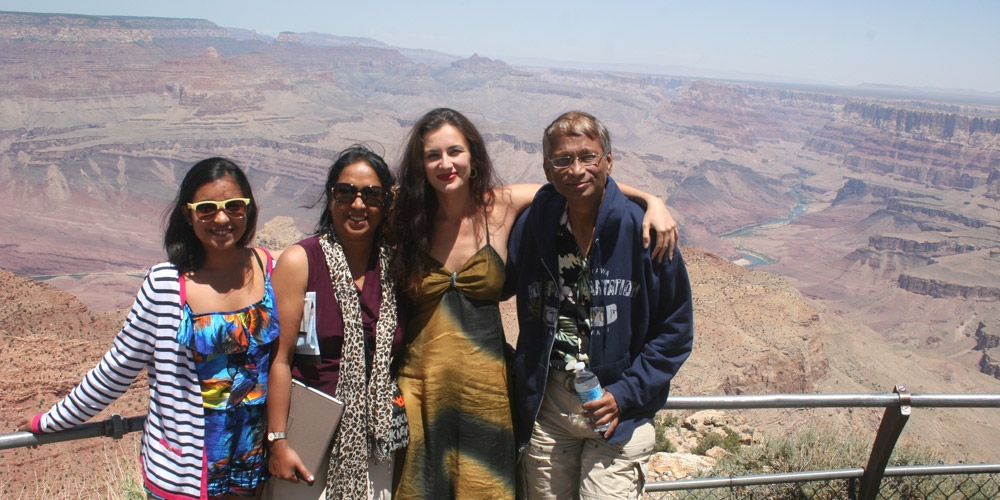Maqsudul Alam Graduate Research Award Fund
“Dr. Alam was a great mentor to me and many others. He pushed us to our limits, but always knew how to maximize our talents so we could shine. He enjoyed sharing his knowledge and would bounce thousands of ideas off of you. During those stimulating discussions, he often said how he wished to be a grad student again and be able to just focus on carrying out the experiments himself.
He knew big things were possible – whether it be scientific discoveries, revamping the department, or setting up new research centers – and didn’t let anything stop him from realizing those dreams. His contributions to UH and the larger scientific community will have long-lasting effects. I’m glad to have been a part of this journey with him.”
—Dr. Jennifer Saito, Dr. Alam’s former PhD student and senior researcher
Lasting Legacy
Join friends, family and colleagues in honoring former UH Mānoa Microbiology Chair Dr. Maqsudul Alam by making a gift to the Maqsudul Alam Graduate Research Award Fund. This fund will help graduate students in microbiology offset the costs associated with their research including travel, materials, equipment and presentation speaking opportunities.
Remembering Maqsudul Alam
 Maqsudul Alam was born in Bangladesh, earned both Master of Science and doctorate degrees in microbiology from Moscow State University, as well as a second doctorate in biochemistry from the Max Planck Institute. He joined UH Mānoa’s Department of Microbiology in 1992.
Maqsudul Alam was born in Bangladesh, earned both Master of Science and doctorate degrees in microbiology from Moscow State University, as well as a second doctorate in biochemistry from the Max Planck Institute. He joined UH Mānoa’s Department of Microbiology in 1992.
Dr. Alam’s career began with studying signal transduction of the halophilic (‘salt-loving’) Archaea. Through this work, he discovered the first myoglobin-like proteins in the Archaea. Coining the terms ‘globin-coupled sensors’ and ‘protoglobins,’ these ancestral proteins offered clues about the earliest life forms to use oxygen.
As part of UH’s Marine Bioproducts Engineering Center and NSF’s Microbial Observatories program, Dr. Alam and his team explored the microbial diversity of lakes throughout the Hawaiian archipelago, Lō‘ihi submarine volcano, and New Zealand’s hydrothermal environments. They were able to cultivate numerous novel species and gain a better understanding of the communities living in these unique environments.
In 2003, Dr. Alam established the Advanced Studies in Genomics, Proteomics and Bioinformatics (ASGPB) in order to provide a shared resource for these emerging fields at UH. Combining the DNA sequencing infrastructure of ASGPB with the bioinformatic resources at the Maui High Performance Computing Center (MHPCC), he ran a Computational Proteomics program that covered the spectrum of wet lab research to in silico informatics. Most notably, the genome of transgenic papaya was sequenced.
Dr. Alam also set up the Centre for Chemical Biology at Universiti Sains Malaysia. In the three years he was director (2009-2012), he established world-class research facilities, launched robust research programs, and accomplished several projects such as sequencing the rubber tree genome.
With a strong desire to give something back to his home of Bangladesh, Dr. Alam led a National Jute Genome Project since 2009. He brought together academic, private and government partners to develop the local talent and build a platform for genome research of international standard in Bangladesh. The team successfully decoded the genomes of two major jute species, as well as a fungus that plagues these crops. It is the goal that this research translates to tangible benefits for the farmers and helps to boost the jute industry.
Big-Hearted Renaissance Man

Dr. Alam is survived by his wife, Rafia, and two daughters, Liliana and Jhsan. He was a loving husband and father, as family always came first. In his free time, he enjoyed photography, cooking and travel. He truly had a big heart and wanted to help people in whatever ways he could.
Inspiring the Next Generation
For more than 20 years, Dr. Alam inspired the next generation of scientists. Through the Maqsudul Alam Graduate Research Award Fund, he will continue to make an impact in the development of more young minds.
Make a Gift
Questions? / More Information
If you would like to learn how you can support UH students and programs like this, please contact us at 808 376-7800 or send us a message.
